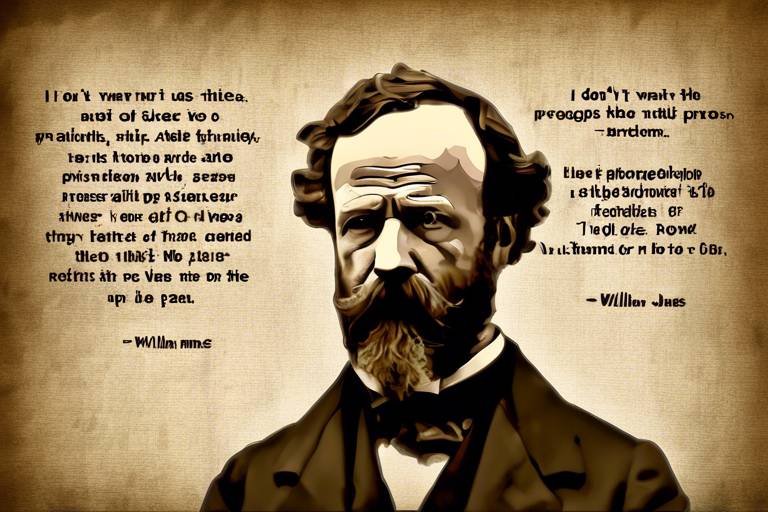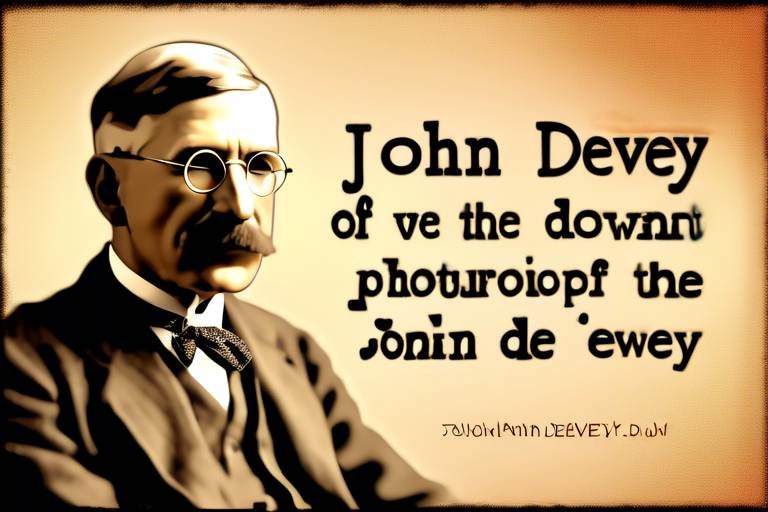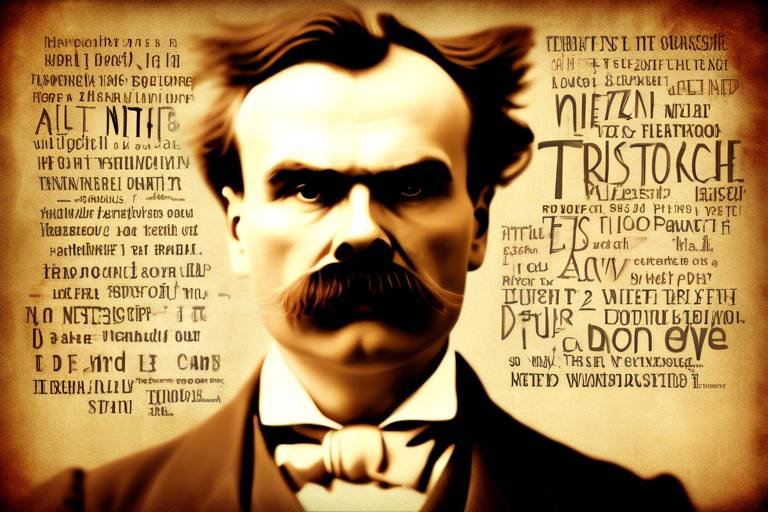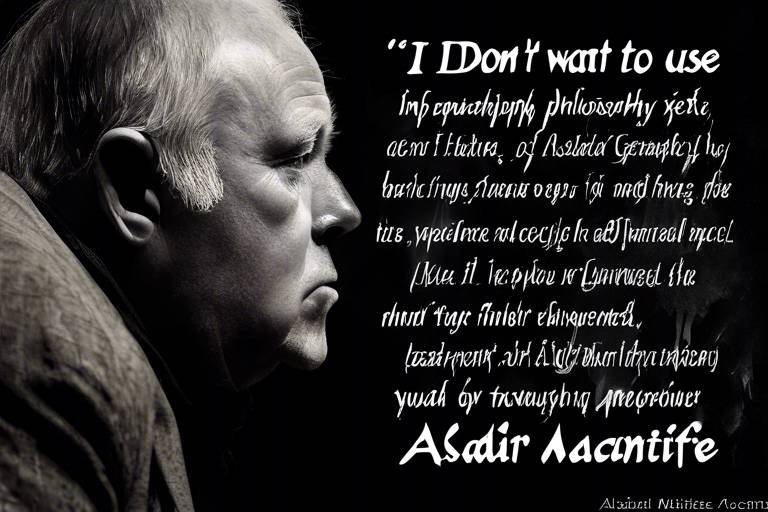Understanding the Pragmatism of William James
William James, a towering figure in American philosophy, is often celebrated for his profound insights into the nature of truth, belief, and experience. His pragmatic approach offers a refreshing lens through which we can examine the world around us. But what exactly does it mean to be pragmatic? In essence, James's pragmatism revolves around the idea that the value of an idea or belief lies in its practical consequences and its ability to enhance human experience. This perspective challenges traditional notions of absolute truth, inviting us to consider how our beliefs shape our actions and, ultimately, our realities.
At its core, James's pragmatism is a call to action. He encourages us to ask ourselves: How do our beliefs influence our lives? Are we merely passive recipients of information, or do we actively engage with our understanding of the world? By emphasizing the importance of human experience, James posits that our interactions with the world are not just passive observations but active engagements that shape our beliefs and, in turn, our lives.
Imagine standing at a crossroads, where each path represents a different belief or idea. According to James, the choice of which path to take should not be dictated solely by abstract reasoning but rather by the potential outcomes of each choice. This is the essence of pragmatism: it’s about navigating the complexities of life with an eye toward practical results. As we delve deeper into James's philosophy, we will uncover how his ideas not only revolutionized philosophy but also had a lasting impact on psychology and our understanding of consciousness.
In the following sections, we will explore the foundational principles of James's pragmatism, his innovative concept of truth, and how his ideas have influenced modern psychology. Through this journey, we will see how James's thoughts continue to resonate in contemporary discussions about belief, action, and the nature of reality itself.
To truly grasp the essence of William James's pragmatism, we must first explore its foundational principles. At the heart of this philosophy is the belief that the meaning of an idea is rooted in its practical applications. This means that instead of viewing concepts as mere abstractions, James encourages us to consider how they manifest in real-life situations. For instance, when we think about the concept of "freedom," we should ask ourselves: What does this idea mean in practice? How does it affect our daily lives and decisions?
James's pragmatism also emphasizes the importance of human experience in shaping our beliefs. He argues that our understanding of truth is not static but is continually evolving based on our interactions with the world. This dynamic view of truth stands in stark contrast to traditional philosophical approaches that often seek to define truth as an unchanging correspondence to reality. According to James, truth is a living entity, one that grows and adapts as we do.
In summary, the foundations of pragmatism as established by William James can be encapsulated in the following key points:
- Practical Consequences: The value of an idea is determined by its practical implications.
- Human Experience: Our beliefs are shaped by our interactions with the world.
- Dynamic Truth: Truth evolves over time, influenced by human actions and experiences.
As we continue to explore James's contributions, we will see how these foundational principles inform his views on truth, belief, and action, ultimately leading us to a richer understanding of the human experience.
When we think about truth, we often envision it as a fixed point—a solid rock that we can rely on. However, William James challenges this notion by proposing that truth is, in fact, a dynamic process. For James, truth is not merely about accurately reflecting reality; it's about how well an idea works in practice. This perspective invites us to consider truth as a tool that we can use to navigate our lives rather than a rigid standard to which we must adhere.
James's unique approach to truth has profound implications for how we understand knowledge and belief. He suggests that instead of searching for absolute truths, we should focus on the effects that our beliefs have on our experiences. This pragmatic theory of meaning emphasizes that the significance of an idea is determined by its practical outcomes in our lives.
In this context, truth becomes a process—one that evolves and adapts as we encounter new experiences and challenges. Just as a river flows and changes course, so too does our understanding of truth shift in response to our actions and interactions. This fluidity not only makes truth more accessible but also more relevant to our everyday lives.
As we delve deeper into James's philosophy, we will explore how this concept of truth as a process influences our understanding of knowledge and belief, ultimately shaping our actions and experiences.
- What is pragmatism? Pragmatism is a philosophical approach that evaluates theories or beliefs based on their practical applications and consequences.
- How did William James contribute to psychology? James's pragmatic philosophy influenced the development of functionalism and the study of consciousness in psychology.
- What is the significance of truth in James's philosophy? James viewed truth as a dynamic process shaped by human experiences, rather than a static correspondence to reality.

The Foundations of Pragmatism
William James, often heralded as the father of pragmatism, established a philosophical framework that fundamentally reshaped how we understand truth, belief, and experience. At its core, pragmatism is not just a set of ideas; it's a method of inquiry that emphasizes the practical consequences of beliefs and theories. Imagine you're trying to navigate through a dense forest. Instead of relying solely on a map that might be outdated or inaccurate, you would pay close attention to the paths that have been traveled, the signs that indicate which way to go, and the experiences of those who have journeyed before you. This is the essence of pragmatism: it values experience and results over abstract principles.
One of the fundamental principles of James's pragmatism is the idea that the truth of a belief is determined by its practical effects. If a belief leads to successful action and helps us navigate our experiences, then it holds truth in a pragmatic sense. This perspective shifts the focus from a static view of truth as a mere correspondence to reality, to a more dynamic understanding where truth is constantly evolving based on human interaction with the world. In this light, beliefs are not just mental constructs; they are tools that we use to engage with our surroundings and achieve our goals.
Moreover, James emphasized the significance of human experience in shaping our beliefs. He argued that our understanding of the world is deeply intertwined with our personal experiences and the context in which they occur. For instance, two individuals may encounter the same event but interpret it differently based on their backgrounds, emotions, and previous experiences. This subjective nature of experience is crucial in pragmatism, as it underscores the idea that knowledge is not universal but rather contextual and fluid.
To further illustrate the foundations of pragmatism, consider the following key aspects:
- Practical Consequences: The truth of a belief is validated through its outcomes.
- Human Experience: Our understanding is shaped by our interactions and experiences in the world.
- Dynamic Nature of Truth: Truth evolves as we gain new experiences and insights.
In essence, the foundations of pragmatism laid by William James invite us to rethink how we approach knowledge and belief. Instead of seeking absolute truths that may not exist, we are encouraged to embrace a more adaptable and experiential approach to understanding our world. This shift in perspective has profound implications, not only for philosophy but also for various fields such as psychology, education, and even everyday decision-making.

James's Concept of Truth
When we think about truth, it often conjures images of something solid and unyielding, like a rock that just sits there, unchanging. But for William James, truth was anything but static. He viewed truth as a dynamic and evolving process, shaped by our experiences and interactions with the world around us. Imagine truth as a river, flowing and changing course rather than a mountain that stands firm and immovable. This perspective is what sets James apart from traditional notions of truth, which often emphasize a correspondence between statements and objective reality.
James famously articulated that "truth is what works." This pragmatic approach suggests that the validity of an idea is contingent upon its practical effects and the outcomes it produces in real-life situations. In other words, if a belief or concept leads to successful action and helps us navigate our experiences, then it can be considered true. This is a refreshing take, especially in a world where people often get bogged down by abstract theories that seem disconnected from everyday life.
To further illustrate James's concept of truth, consider the following points:
- Truth is not static: It evolves over time, influenced by human actions and societal changes.
- Truth is experiential: Our understanding of truth is deeply rooted in our personal experiences and interactions.
- Truth is practical: The significance of an idea is determined by its practical implications and effects on our lives.
One of the most profound implications of James's view is that it challenges the idea of an absolute truth. Instead of seeing truth as a fixed entity, he argued that it is a process—one that is constantly being shaped by our beliefs, actions, and the context in which they occur. This perspective invites us to be more flexible in our thinking and to embrace the idea that what we consider "true" can change as we gather new experiences and insights.
James's assertion that truth is a process also has significant implications for how we acquire knowledge. If truth is adaptable, then our understanding of knowledge must also be responsive to new experiences and contexts. It encourages a mindset of lifelong learning where we are open to revising our beliefs based on new evidence or experiences. In this way, James's philosophy aligns closely with the scientific method, which emphasizes observation, experimentation, and adaptation in the pursuit of knowledge.
In summary, William James's concept of truth invites us to rethink our understanding of reality. Instead of viewing truth as a rigid construct, we are encouraged to see it as a fluid, evolving process. This perspective not only enriches our philosophical discourse but also has practical applications in our everyday lives, urging us to remain open-minded and adaptable in our beliefs and actions.
- What is William James's definition of truth? William James defined truth as a dynamic process that is shaped by human experiences and practical consequences.
- How does James's view of truth differ from traditional views? Unlike traditional views that see truth as static and absolute, James's view emphasizes its evolving and experiential nature.
- What are the practical implications of James's concept of truth? James's concept encourages flexibility in beliefs and promotes lifelong learning, as truth can change based on new experiences.

The Pragmatic Theory of Meaning
William James's approach to meaning is nothing short of revolutionary. At the heart of his pragmatic theory lies the idea that the significance of any concept is deeply intertwined with its practical applications. In simpler terms, James believed that to understand the meaning of an idea, we must look at the effects it has on our experiences and actions. This perspective shifts the focus from abstract definitions to real-world implications, making meaning a living, breathing entity rather than a static notion.
Imagine trying to grasp the meaning of a tool without ever using it. You might read about it, see pictures, or hear others talk about it, but until you put it in your hands and use it, you won’t truly understand its significance. James’s theory operates on this principle: the meaning of an idea is revealed through its practical consequences in our lives. He famously stated, "The meaning of a proposition is to be found in the practical consequences of accepting it." This statement encapsulates the essence of pragmatism, urging us to consider how beliefs and ideas play out in the real world.
To illustrate this further, let’s consider a few examples:
- Belief in Education: If someone believes that education is essential for personal growth, the meaning of that belief can be seen in their actions—such as pursuing further studies or advocating for educational reforms.
- Concept of Freedom: The meaning of freedom varies between individuals; for some, it might mean the ability to express oneself, while for others, it could be the absence of constraints in daily life. The significance of freedom is understood through how it affects their choices and behaviors.
- Value of Friendship: The meaning of friendship is not just a label; it is defined by the shared experiences, support systems, and emotional connections that come into play when individuals interact with one another.
James’s pragmatic theory of meaning also emphasizes that ideas are not isolated; they exist within a broader context of human experience. This means that as our experiences evolve, so too does the meaning of our beliefs. For instance, a person’s understanding of love may change dramatically over time, influenced by relationships, personal growth, and cultural shifts. Thus, meaning becomes a dynamic process, constantly shaped by our interactions with the world around us.
Moreover, James argued that the practical implications of our beliefs are what ultimately validate them. If a belief leads to successful outcomes and enhances our lives, it gains meaning and legitimacy. In contrast, beliefs that fail to produce tangible results may be reconsidered or abandoned. This approach fosters a sense of adaptability and responsiveness, urging individuals to remain open to new experiences and insights that can reshape their understanding of meaning.
In summary, William James's pragmatic theory of meaning challenges us to rethink how we define and understand concepts. By focusing on the practical consequences of our beliefs and ideas, we gain a richer, more nuanced understanding of their significance in our lives. It encourages us to engage with the world actively, allowing our experiences to inform our beliefs and, in turn, shape our reality.

Truth as a Process
William James revolutionized our understanding of truth by presenting it as a dynamic process rather than a static entity. Imagine truth not as a fixed landmark, but as a river that flows and changes course over time, shaped by the experiences and actions of those who navigate it. This perspective invites us to consider how our beliefs and understandings evolve, influenced by the practical consequences they yield in our lives.
For James, the essence of truth lies in its utility. He argued that a statement is true if it proves to be useful in guiding our actions and helping us navigate the world. This means that truth is not just about correspondence with an objective reality; it is about how well our beliefs work in practice. When we encounter new experiences, our understanding of truth can shift, much like adjusting the sails of a ship to catch the wind more effectively.
Consider the implications of this view. If truth is a process, it becomes a living, breathing entity, responsive to our actions. For instance, a scientific theory may be considered true as long as it successfully predicts outcomes and withstands testing. However, as new evidence emerges, our understanding of that theory may change, leading us to revise our beliefs. In this way, truth is akin to a scientific experiment—constantly evolving, adapting, and refining itself based on new data.
James emphasized that this fluidity of truth has profound implications for our knowledge. It suggests that we should approach our beliefs with a sense of openness and flexibility. Instead of clinging to dogmas, we should be willing to let our ideas be challenged and reshaped by our experiences. This adaptability is crucial in a world that is ever-changing, where yesterday's truths may not hold up against today's realities.
In summary, understanding truth as a process encourages us to engage with the world more actively. It invites us to reflect on our beliefs and consider how they serve us in our daily lives. By embracing this pragmatic approach, we can foster a mindset that values growth and learning, allowing us to navigate the complexities of life with greater wisdom and insight.

Implications for Knowledge
When we dive into William James's perspective on knowledge, we find ourselves in a world that challenges the conventional boundaries of what we consider "truth." James argued that knowledge is not a rigid structure but rather a fluid and evolving entity. This notion fundamentally reshapes how we approach learning and understanding. Imagine knowledge as a river, constantly flowing and adapting to the landscape around it. Just as a river carves its path through the earth, our understanding of the world is shaped by our experiences and interactions.
One of the most significant implications of James's pragmatism is that knowledge must be adaptable. In a world that is continuously changing, clinging to outdated beliefs or static truths can hinder our growth and understanding. Instead, James encourages us to embrace a more dynamic view of knowledge, one that is responsive to new experiences and insights. This adaptability is crucial in various fields, from science to ethics, as it allows us to navigate the complexities of life with a more open and flexible mindset.
Furthermore, James's approach suggests that the value of knowledge lies not just in its accuracy but in its practical consequences. Knowledge should be judged by how effectively it helps us navigate our lives and solve real-world problems. For instance, consider the implications in education: if we focus solely on rote memorization of facts, we might miss the opportunity to foster critical thinking and problem-solving skills in students. Instead, an emphasis on understanding concepts and their applications can lead to a more enriching learning experience.
To illustrate this point, let's consider a few key aspects of how James's ideas influence our understanding of knowledge:
- Practical Application: Knowledge should be useful and applicable in real-life situations, guiding our actions and decisions.
- Continuous Evolution: As we encounter new experiences, our understanding must evolve, reflecting the changes in our environment and society.
- Interconnectedness: Knowledge is not isolated; it is interconnected with our beliefs, actions, and experiences, forming a holistic understanding of reality.
In summary, the implications of James's view on knowledge challenge us to rethink traditional epistemologies. By embracing a pragmatic approach, we can cultivate a mindset that values adaptability, practicality, and interconnectedness. This perspective not only enriches our understanding of knowledge but also equips us to face the complexities of modern life with greater resilience and insight.
- What is the main idea of William James's pragmatism?
William James's pragmatism emphasizes the practical consequences of beliefs and ideas, suggesting that their truth is determined by their usefulness in real-world applications. - How does James define truth?
James views truth as a dynamic process that evolves over time, shaped by human actions and experiences, rather than as a static correspondence to reality. - What are the implications of James's philosophy for education?
James's philosophy suggests that education should focus on fostering critical thinking and practical applications of knowledge rather than rote memorization of facts. - How does pragmatism influence modern psychology?
Pragmatism informs contemporary psychological theories by emphasizing the importance of understanding human behavior in context and recognizing the fluid nature of mental processes.

Belief and Action
William James, a towering figure in philosophy, made a compelling case for the intrinsic link between belief and action. He argued that beliefs are not mere abstract ideas floating in the ether; rather, they are powerful motivators that propel us into action. Imagine beliefs as the fuel in a car; without fuel, the car sits idle, no matter how sleek or shiny it may be. In the same way, our beliefs drive us to take steps in our lives, shaping our decisions and ultimately determining the paths we choose to follow.
James posited that beliefs must manifest in actions that yield tangible results. He famously stated, “The greatest use of a life is to spend it on something that will outlast it.” This assertion underscores the idea that our beliefs should lead us to actions that create lasting impact. For instance, consider someone who believes in the importance of education. If that belief is genuine, it will likely lead them to pursue further education, teach others, or advocate for educational reforms. In this context, belief becomes a catalyst for action, transforming abstract ideas into concrete outcomes.
Furthermore, James emphasized the role of experience in shaping our beliefs and actions. He believed that our interactions with the world inform our understanding and, consequently, our beliefs. This relationship can be illustrated by the following points:
- Experiential Learning: Our beliefs evolve through experiences, which serve as a testing ground for their validity.
- Feedback Loop: Actions taken based on beliefs can lead to new experiences, which in turn influence and sometimes alter those beliefs.
- Practical Consequences: The outcomes of our actions provide a reality check, prompting us to reassess our beliefs if the results are not as expected.
This dynamic interplay between belief and action is crucial not only for personal growth but also for societal progress. When individuals act on their beliefs, they contribute to a collective effort that can lead to significant change. For example, social movements often begin with a shared belief in justice or equality, which inspires individuals to take action—whether through protests, advocacy, or community service. The ripple effect of such actions can lead to profound societal transformation, illustrating how the marriage of belief and action can shape the course of history.
In conclusion, James's exploration of belief and action invites us to reflect on our own lives. Are our beliefs merely theoretical, or do they inspire us to take meaningful action? By examining the consequences of our beliefs, we can better understand their power and significance. In a world where uncertainty often reigns, grounding ourselves in beliefs that compel us to act can lead to a more fulfilling and impactful existence.
- What is the main idea behind James's belief and action theory? James argued that beliefs are not just thoughts; they must lead to actions that yield real-world consequences.
- How do beliefs influence our daily decisions? Beliefs act as motivators that guide our choices and behaviors, shaping our interactions with the world.
- Can beliefs change over time? Yes, beliefs can evolve based on new experiences and the outcomes of previous actions, highlighting the dynamic nature of human understanding.
- What role does experience play in shaping beliefs? Experience serves as a testing ground for beliefs, allowing individuals to assess their validity and make adjustments as necessary.

James's Influence on Psychology
William James, often hailed as the father of American psychology, made waves with his pragmatic philosophy, which profoundly shaped the field of psychology as we know it today. His ideas were not just theoretical musings; they were grounded in the everyday experiences of individuals, emphasizing that understanding the mind requires a practical approach. James believed that psychology should be concerned with the *function of consciousness* rather than merely its structure. This notion paved the way for the development of functionalism, a perspective that focuses on the purpose of mental processes in adapting to the environment.
One of James's most significant contributions to psychology is his concept of the stream of consciousness. He described consciousness as a flowing river of thoughts, feelings, and perceptions, constantly changing and evolving. This idea challenged the traditional view of consciousness as a static entity, suggesting instead that our mental life is a dynamic process. Imagine trying to catch a fish in a river; just as the water keeps flowing, so do our thoughts. This metaphor illustrates how our experiences shape our understanding of reality, highlighting the importance of context and change in psychological study.
Moreover, James's influence extends beyond functionalism into various psychological theories that embrace the complexities of human behavior. His emphasis on the *practical implications* of beliefs and actions resonates in modern psychology, particularly in areas such as cognitive-behavioral therapy (CBT). In CBT, the focus is on how thoughts influence feelings and behaviors, aligning closely with James's assertion that our beliefs must lead to actions that yield tangible results. This approach encourages individuals to challenge their thoughts and beliefs, promoting a more adaptive and functional way of living.
James's ideas also laid the groundwork for the study of emotions and their impact on human behavior. He famously proposed the James-Lange theory of emotion, which posits that our physiological reactions precede the emotional experience. For instance, when we encounter a bear in the woods, our heart races, and we start to sweat before we consciously feel fear. This groundbreaking perspective shifted the focus from emotions as mere feelings to a more holistic view that includes bodily responses, influencing how psychologists understand emotional experiences today.
In contemporary psychology, James's pragmatic approach is reflected in various therapeutic practices that prioritize the individual's lived experience. Many modern psychologists adopt a similar stance, advocating for methods that are adaptable and responsive to the unique circumstances of each person. By emphasizing the importance of experience, James encouraged a more personalized approach to psychological treatment, which remains relevant as we navigate the complexities of mental health in today's world.
In summary, William James's influence on psychology is profound and enduring. His pragmatic philosophy not only shaped early psychological thought but also continues to inform modern practices. By focusing on the practical consequences of beliefs, the dynamic nature of consciousness, and the interplay between emotions and actions, James opened new avenues for understanding the human mind. His legacy is a testament to the power of ideas and their ability to transform fields of study, reminding us that psychology is as much about real-life experiences as it is about theories and constructs.
- What is William James known for in psychology?
William James is known for founding functionalism and introducing the concept of the stream of consciousness, emphasizing the practical applications of psychological theories.
- How did James's ideas influence modern psychology?
James's pragmatic approach influenced various psychological theories, including cognitive-behavioral therapy, by highlighting the importance of experience and the relationship between beliefs and actions.
- What is the James-Lange theory of emotion?
The James-Lange theory posits that physiological reactions occur first, followed by the emotional experience, suggesting that our bodily responses shape our feelings.

The Stream of Consciousness
William James's concept of the stream of consciousness is one of the most compelling ideas in his pragmatic philosophy. Imagine your thoughts flowing like a river, constantly changing, merging, and diverging. This metaphor captures the essence of how our minds work—thoughts are not isolated events but rather a continuous flow of experiences and reflections. James proposed that consciousness is not a static entity; instead, it is a dynamic process that reflects our ongoing interactions with the world around us.
At its core, the stream of consciousness highlights the fluidity of our mental states. James argued that our thoughts are interconnected, much like a tapestry woven from various threads of experience. Each thought influences the next, creating a rich tapestry of perception that shapes our understanding of reality. This idea challenges the traditional notion of consciousness as a series of discrete, separate moments. Instead, it emphasizes the importance of context and the interplay of thoughts over time.
To illustrate this, consider how a single moment can trigger a cascade of memories and emotions. For instance, smelling a familiar scent might transport you back to a childhood memory, evoking feelings of nostalgia and warmth. This is the essence of the stream of consciousness—our thoughts are not isolated but deeply intertwined with our experiences, emotions, and perceptions. James believed that understanding this flow is crucial for grasping how we navigate our lives.
Furthermore, the stream of consciousness has profound implications for psychology and our understanding of human behavior. It suggests that to truly comprehend an individual, one must consider the entirety of their experiences and how these experiences shape their current thoughts and actions. This holistic approach aligns with modern psychological theories that emphasize the importance of context in understanding behavior.
James's insights into the stream of consciousness also paved the way for further exploration into the nature of thought processes and mental phenomena. His work inspired later psychologists and philosophers, leading to the development of theories that explore how our minds work in a more integrated and dynamic manner. For example, the concept of associative thinking—where one thought leads to another—can be traced back to James's ideas. This approach not only enriches our understanding of cognition but also emphasizes the importance of personal experience in shaping our mental landscapes.
In summary, the stream of consciousness is a foundational concept in William James's philosophy that underscores the interconnectedness of our thoughts and experiences. It invites us to view our mental life as an ongoing process rather than a series of isolated events. This perspective not only reshapes our understanding of consciousness but also has lasting implications for psychology and how we approach the study of the mind.
- What is the stream of consciousness? The stream of consciousness is a concept introduced by William James that describes the continuous flow of thoughts and experiences in our minds, emphasizing their interconnectedness.
- How does the stream of consciousness relate to psychology? It highlights the importance of understanding the holistic nature of human thought processes and behaviors, influencing modern psychological theories.
- Can you provide an example of the stream of consciousness in action? Yes! A simple example is when a specific smell triggers a memory, leading to a chain of thoughts and emotions related to that memory, illustrating how interconnected our mental experiences are.

stream of consciousness,
The concept of the stream of consciousness is one of William James's most fascinating contributions to psychology and philosophy. Imagine your thoughts as a flowing river, where every ripple and wave represents a different idea or emotion. This metaphor captures the essence of how James viewed human consciousness—not as a series of isolated snapshots, but as a continuous, dynamic flow of experiences. He believed that our thoughts are not discrete entities; rather, they are interconnected, constantly evolving, and influenced by our surroundings and inner states.
James proposed that this stream is a fundamental aspect of our mental life, emphasizing that consciousness is always in motion. He famously noted that "consciousness does not appear to itself chopped up in bits." Instead, it is a seamless experience where past memories, present sensations, and future anticipations blend together. This perspective challenges the traditional notion of consciousness as a static entity, suggesting instead that it is fluid and adaptable, much like water that shapes and reshapes the landscape it flows through.
To further illustrate this concept, consider the following aspects of the stream of consciousness:
- Continuity: Our thoughts flow into one another, creating a narrative that is uniquely ours. This continuity shapes our identity and influences how we perceive the world.
- Personal Experience: Each person's stream of consciousness is distinct, shaped by individual experiences, emotions, and memories. This personal lens affects how we interpret events and interact with others.
- Dynamic Nature: Just like a river can change course, our thoughts can shift direction based on new experiences or insights. This adaptability is crucial for personal growth and understanding.
James's idea of the stream of consciousness has profound implications for psychology, particularly in understanding how we process information and navigate our daily lives. It suggests that our mental processes are not merely reactions to stimuli but are deeply influenced by our ongoing internal dialogue and reflections.
In modern psychology, this concept has paved the way for various approaches to understanding the mind. For instance, it has influenced the development of functionalism, which focuses on how mental processes function to help individuals adapt to their environments. Furthermore, the stream of consciousness has inspired literary techniques in narrative storytelling, allowing authors to capture the intricate flow of thoughts and feelings in a way that mirrors real human experience.
Ultimately, James's exploration of the stream of consciousness invites us to appreciate the richness of our inner lives. It encourages us to recognize that our thoughts are not isolated incidents but part of a larger tapestry of experiences that shape who we are. By embracing this fluidity of thought, we can better understand ourselves and the world around us, leading to a more profound connection with our own consciousness.
- What is the stream of consciousness? The stream of consciousness refers to the continuous flow of thoughts, feelings, and experiences that shape our understanding of reality, as proposed by William James.
- How does the stream of consciousness impact psychology? It influences how we understand mental processes, leading to approaches like functionalism that focus on the adaptive nature of consciousness.
- Why is the stream of consciousness important? It emphasizes the interconnectedness of our thoughts and experiences, helping us appreciate the complexity of human consciousness.

emphasizing the continuous flow of thoughts and experiences that shape our understanding of reality.
William James's concept of the stream of consciousness is a fascinating exploration of how our thoughts, feelings, and experiences intertwine to shape our perception of reality. Imagine your mind as a flowing river, where each thought is a droplet of water, continuously moving and merging with others, creating a dynamic and ever-changing landscape. This analogy helps illustrate how our mental processes are not isolated events but rather a seamless flow that reflects the complexity of human experience.
In this stream, each thought is influenced by the previous ones, forming a tapestry of consciousness that is rich and multifaceted. James argued that our awareness is not a series of disconnected moments; instead, it is a continuous flow that captures the essence of our existence. This perspective challenges the traditional notion of consciousness as a static entity, suggesting instead that it is fluid and adaptable, constantly shaped by our interactions with the world around us.
To further understand this concept, consider the following key aspects of James's stream of consciousness:
- Continuity: Our thoughts are not isolated; they build upon one another, creating a rich narrative of our experiences.
- Personal Experience: Each individual's stream is unique, influenced by personal history, emotions, and perceptions.
- Dynamic Nature: Just as a river can change course, our thoughts can shift and evolve based on new experiences and insights.
This idea of a continuous flow has profound implications for how we understand our realities. It suggests that our beliefs and perceptions are not fixed; they can change as we encounter new information or experiences. For instance, when faced with a challenging situation, our initial thoughts might be negative, but as we reflect and adapt, we may find a more positive perspective. This adaptability is a crucial aspect of human psychology, allowing us to navigate the complexities of life.
Moreover, James's stream of consciousness highlights the importance of context in shaping our understanding. Just as the environment influences the flow of a river, our surroundings, relationships, and societal norms play a significant role in how we interpret our experiences. This interconnectedness emphasizes that our reality is not solely an individual construct; it is also shaped by the collective experiences of those around us.
In summary, William James's concept of the stream of consciousness offers a profound lens through which we can examine our thoughts and experiences. By recognizing that our consciousness is a fluid and dynamic process, we can better appreciate the richness of human experience and the ever-evolving nature of our understanding of reality.
- What is the stream of consciousness?
The stream of consciousness is a concept introduced by William James that describes the continuous flow of thoughts and experiences in the human mind, emphasizing that these processes are interconnected and dynamic.
- How does the stream of consciousness relate to our understanding of reality?
This concept suggests that our understanding of reality is shaped by the ongoing interplay of our thoughts, experiences, and the context in which we find ourselves, leading to a more fluid and adaptable perception of the world.
- Why is the stream of consciousness important in psychology?
It highlights the complexity of mental processes and the importance of considering the continuity of thoughts and experiences, which can enhance our understanding of human behavior and cognition.

Pragmatism in Modern Psychology
When we think about psychology today, it's fascinating to realize how deeply William James's pragmatic philosophy has woven itself into the fabric of modern psychological theories. His emphasis on the practical consequences of beliefs and actions resonates profoundly in contemporary psychological practices. For instance, consider how therapists often focus on the outcomes of their interventions rather than just the theoretical underpinnings. This shift towards practical application is a direct reflection of James's influence, highlighting the importance of results in understanding human behavior.
Moreover, James's notion that our thoughts and feelings are not isolated events but part of a continuous flow—what he termed the stream of consciousness—has paved the way for modern approaches in psychology. This concept encourages psychologists to view mental processes as dynamic and interconnected. Instead of analyzing thoughts as discrete entities, modern psychologists recognize the fluidity of human experience, which aligns with James's assertion that our understanding of reality is shaped by an ongoing interaction with our environment.
In practical terms, this means that contemporary psychology often employs methods that are adaptable and responsive to the individual. For example, in therapeutic settings, practitioners might use cognitive-behavioral therapy (CBT) techniques that encourage clients to experiment with new behaviors and beliefs, assessing their effectiveness in real-world situations. This hands-on approach mirrors James's idea that the value of a belief lies in its practical application and the results it produces in a person's life.
Additionally, James's pragmatic lens has influenced the study of human behavior and the complexities of mental processes in several key areas:
- Functionalism: This school of thought emerged as a direct response to structuralism, emphasizing the purpose of mental processes in adapting to the environment.
- Behaviorism: While focusing on observable behaviors, behaviorism shares a pragmatic foundation by assessing the practical outcomes of actions.
- Humanistic Psychology: This approach prioritizes personal growth and self-actualization, echoing James's belief in the importance of individual experience.
Ultimately, the impact of James's pragmatism is evident in how modern psychology approaches research, therapy, and understanding of the human mind. By prioritizing the practical implications of psychological theories, practitioners can offer more effective and tailored solutions to their clients. This adaptability not only reflects the fluid nature of human experience but also honors James's legacy as a pioneer of a philosophy that champions the importance of action and results.
Q1: How does William James's pragmatism influence therapy today?
A1: James’s pragmatism encourages therapists to focus on the practical outcomes of their interventions, prioritizing what works for the individual in real-world situations.
Q2: What is the stream of consciousness, and why is it important?
A2: The stream of consciousness is a concept introduced by James that describes the continuous flow of thoughts and feelings. It's important because it helps psychologists understand the interconnectedness of mental processes.
Q3: How does pragmatism relate to modern psychological theories?
A3: Pragmatism relates to modern theories by emphasizing the importance of practical consequences, adaptability, and the necessity of aligning psychological practices with real-life experiences.
Frequently Asked Questions
- What is the core idea of William James's pragmatism?
William James's pragmatism centers around the idea that the truth of an idea is determined by its practical consequences. Essentially, if an idea works effectively in real-life situations, it is considered true. This approach emphasizes the importance of human experience and action in shaping beliefs and understanding.
- How does James define truth?
James defines truth not as a static correspondence to reality but as a dynamic process. He believes that truth evolves over time, shaped by our experiences and actions. This means that what we consider "true" can change based on new insights and practical outcomes, making truth a living concept rather than a fixed entity.
- What is the pragmatic theory of meaning?
The pragmatic theory of meaning, according to James, suggests that the significance of an idea or concept is determined by its practical effects on human experiences. In other words, the meaning of something is rooted in how it impacts our actions and lives, rather than existing in isolation or as an abstract notion.
- What implications does James's view of truth have for knowledge?
James's perspective implies that knowledge must be adaptable and responsive to new experiences. Since truth is not fixed, our understanding of knowledge should also be flexible, allowing for growth and change as we encounter different situations and learn from them.
- How does belief relate to action in James's philosophy?
In James's view, beliefs are not just abstract thoughts; they must lead to actions that produce tangible results in the world. He argues that the value of a belief is demonstrated through its ability to influence our actions and the outcomes they generate, making the relationship between belief and action crucial in his pragmatic framework.
- What is the 'stream of consciousness' concept?
The 'stream of consciousness' is a concept introduced by James that describes the continuous flow of thoughts and experiences that shape our understanding of reality. This idea emphasizes that our consciousness is not a series of isolated events but a fluid and interconnected experience, reflecting the complexities of human thought and perception.
- How has James influenced modern psychology?
William James's pragmatic philosophy has significantly influenced modern psychology, particularly in areas like functionalism and the study of consciousness. His insights into human behavior and mental processes continue to inform contemporary psychological theories, helping us understand the complexities of the mind and the importance of experience in shaping our thoughts and actions.



















